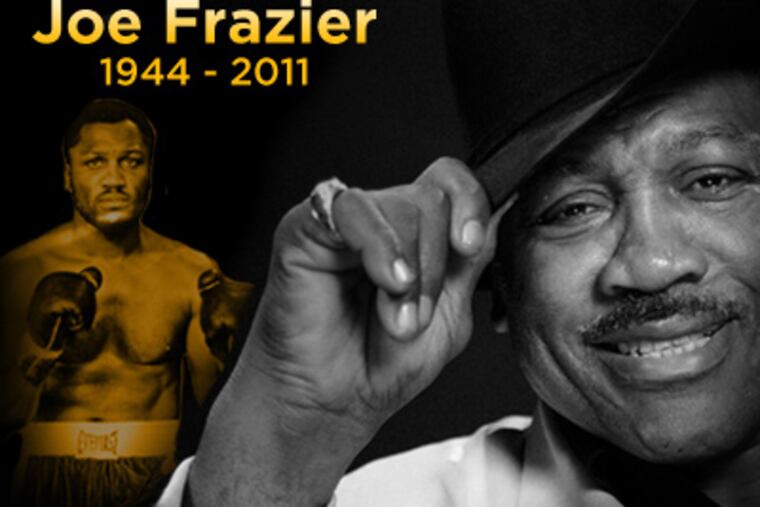Frazier: Working man's champion
JOE FRAZIER beat up his sparring partners because he couldn't pull his punches and because he wouldn't pull his punches. Didn't want any bad habits seeping into his arsenal, the weapons of a heavyweight with short arms and a large heart.

JOE FRAZIER beat up his sparring partners because he couldn't pull his punches and because he wouldn't pull his punches. Didn't want any bad habits seeping into his arsenal, the weapons of a heavyweight with short arms and a large heart.
He'd beat 'em up because they were getting paid and he needed to work hard because that was the only way he knew how to work. Learned that as a share-cropper's son growing up in Beaufort, S.C., trudging behind that mule from sunup 'til sundown, carving furrows in the moist earth for next year's crops, picking okra for pennies on the pound, plucking cotton.
Frazier felt sorry for the sparring partners he'd beat up but you can't show pity without losing respect in a training camp, so Frazier would take even money instead of 2-to-1 when he had to make a 4 or a 10, and if they shot craps long enough, two or three times a week, the sparring partners could pick up a couple hundred apiece from the heavyweight champion and that was balm for some of the bruises they'd collected in the ring.
That symbolized Frazier to me, hard worker with a generous heart. And it explains in part why he was so wounded by Muhammad Ali and probably never forgave him for the taunts and the insults and the demeaning rhetoric he endured before their legendary fights.
Frazier asked the president of the United States to permit Ali to fight while he fought his draft evasion verdict through the courts. Gave Ali money. Offered his friendship. And then Ali called him an "Uncle Tom" and the gorilla he would face one last time in Manila.
Frazier couldn't win a debate with Ali, but he hammered out a victory in that first fight and summoned the skill and courage to battle Ali into the 14th round in Manila before Eddie Futch kept a half-blinded Frazier from going out there again.
They brought out the best in each other in the ring and the worst in each other outside the ring. And now Frazier is gone and Ali cannot put two sentences together to mourn our loss. And that is terribly sad.
That first fight, when Frazier floored Ali with a left hook, he said he brought that from down home. He meant Beaufort, even though he learned his craft in Philly, and made his home here.
We trailed Frazier to Beaufort for a documentary called "Heavyweight, Inc." to explain the Cloverlay syndicate that backed him. The cameras did not follow him inside the bank where they turned him away when the heavyweight champion of the world tried to cash a check.
He shrugged, he sighed, and then he came back in a year or so and spoke to the South Carolina Legislature and walked away triumphant. Frazier could do that. He would accept an invitation to speak at the Union League when the Union League was as discriminatory as Beaufort, saying that maybe after they heard him speak they would change their minds about who was welcome and who was not.
It was Ali who got credit he didn't deserve as a civil-rights advocate, it was Frazier who got ignored. He was a fighter, pure and simple, with a style that seemed destined for a short career. Trudge forward, lean on the other guy, take two to land one.
"You've gotta breathe on him," Frazier would say, in a rare attempt to define his style. "No shortcuts" was his mantra. There's a lesson there for all of us.
Ali had more charisma, Frazier had more fire in his belly. They both won Olympic gold medals, but Frazier won his with a busted thumb. And when he returned to Philadelphia his job at the slaughterhouse was gone because you can't push sides of beef around with a busted thumb.
And then he won the heavyweight championship and gave us those legendary fights with Ali and the city never got around to honoring Frazier. Somehow they found a place for a hokey sculpture of Rocky Balboa, a fictional palooka.
Maybe now, too late for Frazier to see it happen, they will find the money and energy and a proper place to honor his memory. They might want to name a Police Athletic League center after him. That's where he got his start, that might encourage kids, that might inspire kids.
Put a banner on the wall that says "No shortcuts." Frazier would have liked that.